Ditapis dengan
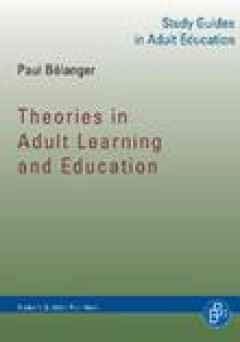
Theories in Adult Learning and Education
Adult Learning and Education The graduate student guide in adult education explores theories of adult learning and adult education participation. It provides a frame of reference for understanding the development of a rapidly evolving field and for enhancing knowledge and competencies in this professional domain. The publication is divided into two sections: a section on adult learning theories…
- Edisi
- -
- ISBN/ISSN
- 9783866493629
- Deskripsi Fisik
- 106p.. ill.
- Judul Seri
- -
- No. Panggil
- 374 bel t

The theory and practice of online learning
Every chapter in the widely distributed first edition has been updated, and four new chapters on current issues such as connectivism and social software innovations have been added. Essays by practitioners and scholars active in the complex, diverse, and rapidly evolving field of distance education blend scholarship and research; practical attention to the details of teaching and learning; and …
- Edisi
- -
- ISBN/ISSN
- 9781897425077
- Deskripsi Fisik
- 472 p.
- Judul Seri
- -
- No. Panggil
- 371.334 THE t
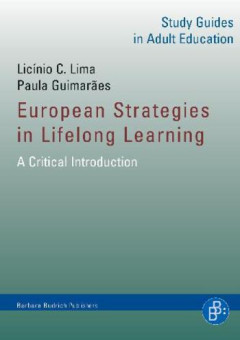
European strategies in lifelong learning :a critical introduction
Lifelong learning and education is a key concept for the development of adult education as an area of practice and theoretical consideration. In recent decades, meanwhile, the idea of lifelong education and learning has been central to the guidance of various international organisations of many countries.
- Edisi
- -
- ISBN/ISSN
- 9783866494442
- Deskripsi Fisik
- 165p. : ill.
- Judul Seri
- -
- No. Panggil
- 371.30281094 LIM e

Emergence and innovation in digital learning:foundation and application
Educational systems worldwide are facing an enormous shift as a result of sociocultural, political, economic, and technological changes. The technologies and practices that have developed over the last decade have been heralded as opportunities to transform both online and traditional education systems. While proponents of these new ideas often postulate that they have the potential to address …
- Edisi
- -
- ISBN/ISSN
- 9781771991506
- Deskripsi Fisik
- xvi, 211p.: ill.
- Judul Seri
- -
- No. Panggil
- 371.358 eme e
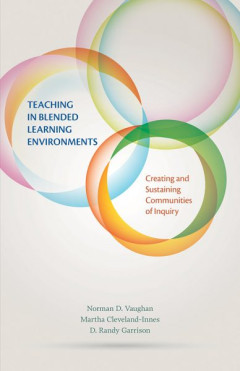
Teaching in blended learning environments:Creating and sustaining communities…
- Edisi
- -
- ISBN/ISSN
- 9781927356487
- Deskripsi Fisik
- x, 142p.: ill.
- Judul Seri
- -
- No. Panggil
- 371.3 vau t
- Edisi
- -
- ISBN/ISSN
- 9781927356487
- Deskripsi Fisik
- x, 142p.: ill.
- Judul Seri
- -
- No. Panggil
- 371.3 vau t
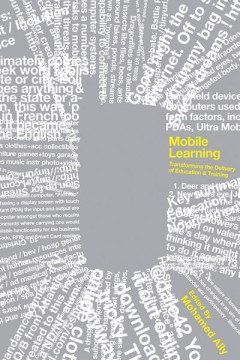
Mobile LearningTransforming the Delivery of Educationand Training
This book reports on a novel and comprehensive approach to the uptake of ICT in Schools. It focuses on key questions, pedagogically sound ways of introducing ICT, new technical artifacts supporting the approach, the evaluation in a large-scale validator, and future work. While many innovations in Technology Enhanced Learning (TEL) have emerged over the last two decades, the uptake of these inno…
- Edisi
- -
- ISBN/ISSN
- 9781897425442
- Deskripsi Fisik
- xx, 297 p.: ill.;
- Judul Seri
- -
- No. Panggil
- 371.33 mob m
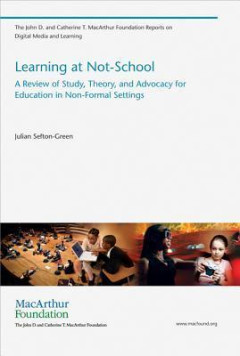
Learning at not-school :a review of study, theory, and advocacy for education…
A review of research on “not-school” learning that investigates what is distinctive in the quality of learning in these settings.Schools do not define education, and they are not the only institutions in which learning takes place. After-school programs, music lessons, Scouts, summer camps, on-the-job training, and home activities all offer out-of-school educational experiences. In Learning…
- Edisi
- -
- ISBN/ISSN
- 9780262518246
- Deskripsi Fisik
- vii, 92p. : ill.
- Judul Seri
- -
- No. Panggil
- 371.19 SEF l
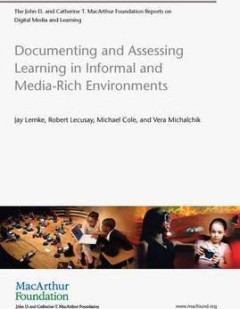
Documenting and assessing learning in informal and media-rich environments
An extensive review of the literature on learning assessment in informal settings, expert discussion of key issues, and a new model for good assessment practice. Today educational activities take place not only in school but also in after-school programs, community centers, museums, and online communities and forums. The success and expansion of these out-of-school initiatives depends on our ab…
- Edisi
- -
- ISBN/ISSN
- 9780262527743
- Deskripsi Fisik
- vii, 156p. : ill.
- Judul Seri
- -
- No. Panggil
- 371.04 LEM d
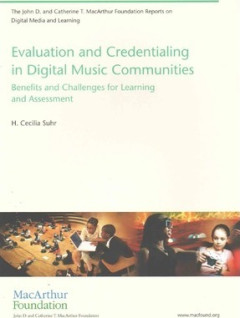
Evaluation and credentialing in digital music communities :benefits and chall…
An examination of the use of digital badges as a reward for both casual online music evaluators and professional musicians.Professional and amateur musicians alike use social media as a platform for showcasing and promoting their music. Social media evaluation practices—rating, ranking, voting, “liking,” and “friending” by ordinary users, peers, and critics—have become essential pro…
- Edisi
- -
- ISBN/ISSN
- 9780262527149
- Deskripsi Fisik
- vii, 102p. : ill.
- Judul Seri
- -
- No. Panggil
- 780.2854678 SUH e
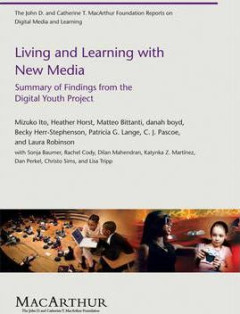
Living and learning with new media :summary of findings from the digital yout…
This report summarizes the results of an ambitious three-year ethnographic study, funded by the John D. and Catherine T. MacArthur Foundation, into how young people are living and learning with new media in varied settings—at home, in after school programs, and in online spaces. It offers a condensed version of a longer treatment provided in the book Hanging Out, Messing Around, and Geeking O…
- Edisi
- -
- ISBN/ISSN
- 9780262513654
- Deskripsi Fisik
- xx, 98p. : ill.
- Judul Seri
- -
- No. Panggil
- 302.23108350973 MIZ l
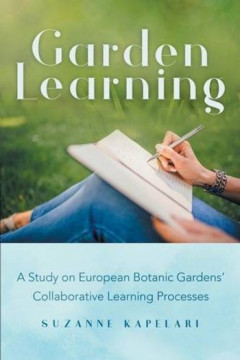
Garden learning :a study on European botanic gardens' collaborative learning …
"From 2007-2013 the European 7th Framework Program Science in Society (FP7) funded a multitude of formal and informal educational institutions to join forces and engage in alternative ways to teach science—inside and outside the classroom—all over Europe. This book reports on one of these projects named INQUIRE which was developed and implemented to support 14 Botanic Gardens and Natural Hi…
- Edisi
- -
- ISBN/ISSN
- 9781909188662
- Deskripsi Fisik
- vi, 185p. : ill.
- Judul Seri
- -
- No. Panggil
- 370 KAP g
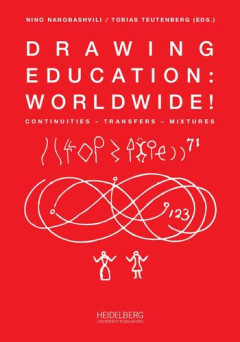
Drawing education :wordwide! : continuities - transfers - mixtures
As a cultural technique, drawing was firmly anchored in the realities of European society from early modern to modern times. Based on this fact, the present volume asks for the first time about the significance of drawing and drawing education in other cultural areas. Indigenous methods of drawing and sign-learning in Arabic, Asian, Latin American, North American and European countries are addr…
- Edisi
- -
- ISBN/ISSN
- 9783947732302
- Deskripsi Fisik
- vii, 323p. : ill.
- Judul Seri
- -
- No. Panggil
- 370 NAN d
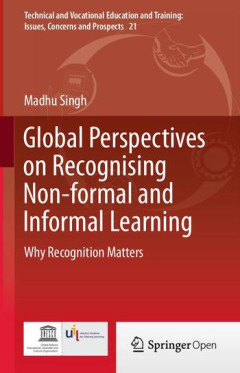
Global perspectives on recognising non-formal and informal learning :why reco…
This book deals with the relevance of recognition and validation of non-formal and informal learning education and training, the workplace and society. In an increasing number of countries, it is at the top of the policy and research agenda ranking among the possible ways to redress the glaring lack of relevant academic and vocational qualifications and to promote the development of competences…
- Edisi
- -
- ISBN/ISSN
- 9783319152783
- Deskripsi Fisik
- xix, 220p : ill.
- Judul Seri
- -
- No. Panggil
- 370.11 SIN g
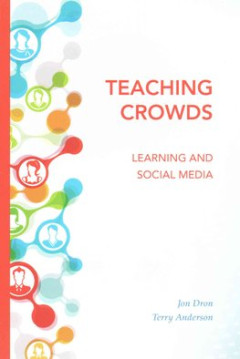
Teaching crowds :learning and social media
Within the rapidly expanding field of educational technology, learners and educators must confront a seemingly overwhelming selection of tools designed to deliver and facilitate both online and blended learning. Many of these tools assume that learning is configured and delivered in closed contexts, through learning management systems (LMS). However, while traditional "classroom" learning is by…
- Edisi
- -
- ISBN/ISSN
- 9781771990004
- Deskripsi Fisik
- xv, 353p. : ill.
- Judul Seri
- -
- No. Panggil
- 371.33 DRO t
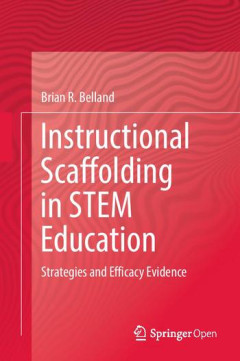
Instructional scaffolding in STEM education :strategies and efficacy evidence
This book uses meta-analysis to synthesize research on scaffolding and scaffolding-related interventions in STEM (science, technology, engineering, and mathematics) education. Specifically, the volume examines the extent to which study quality, assessment type, and scaffolding characteristics (strategy, intended outcome, fading schedule, scaffolding intervention, and paired intervention) influe…
- Edisi
- -
- ISBN/ISSN
- 9783319025650
- Deskripsi Fisik
- xi, 144p. : ill.
- Judul Seri
- -
- No. Panggil
- 510.71 BEL i
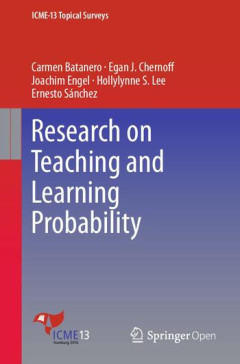
Research on teaching and learning probability
This book summarizes the vast amount of research related to teaching and learning probability that has been conducted for more than 50 years in a variety of disciplines. It begins with a synthesis of the most important probability interpretations throughout history: intuitive, classical, frequentist, subjective, logical propensity and axiomatic views. It discusses their possible applications, p…
- Edisi
- -
- ISBN/ISSN
- 9783319316253
- Deskripsi Fisik
- -
- Judul Seri
- -
- No. Panggil
- 519.2071 BAT r
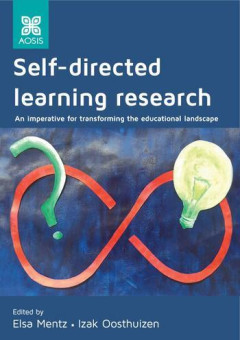
Self-directed learning research :an imperative for transforming the education…
This book will benefit specialists in the field of the education sciences. It represents significant progress in knowledge production. Self-directed learning has become increasingly important, not only for education in South Africa but also for education sciences in the international arena. This is a result of the changing education landscape, caused by the demands of the 21st century as well a…
- Edisi
- -
- ISBN/ISSN
- 9781928396017
- Deskripsi Fisik
- xxxi, 298p. : ill.
- Judul Seri
- -
- No. Panggil
- 374.0019 SEL s
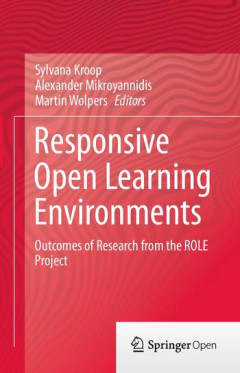
Responsive open learning environments :outcomes of research from the ROLE Pro…
This book presents the outcomes of four years of educational research in the EU-supported project called ROLE (Responsive Online Learning Environments). ROLE technology is centered around the concept of self-regulated learning that creates responsible learners, who are capable of critical thinking and able to plan their own learning processes. ROLE allows learners to independently search for ap…
- Edisi
- -
- ISBN/ISSN
- 9783319023991
- Deskripsi Fisik
- xxvi, 252p. : ill.
- Judul Seri
- -
- No. Panggil
- 371.3943 RES r
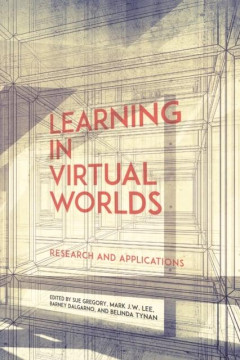
Learning in virtual worlds :research and applications
Three-dimensional (3D) immersive virtual worlds have been touted as being capable of facilitating highly interactive, engaging, multimodal learning experiences. Much of the evidence gathered to support these claims has been anecdotal but the potential that these environments hold to solve traditional problems in online and technology-mediated education—primarily learner isolation and student …
- Edisi
- -
- ISBN/ISSN
- 9781771991360
- Deskripsi Fisik
- xxvii, 329p. : ill.
- Judul Seri
- -
- No. Panggil
- 371.33468 LEA l
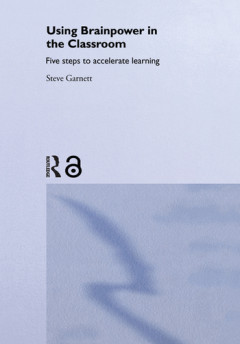
Using brainpower in the classroom :five steps to accelerate learning
This book offers a realistic, practical and accessible model to allow teachers to incorporate the best of recent brain-based research into their teaching. The five steps involve: making learning multi-sensory ensuring activities match the dominant intelligence of the learner matching types of learning to the gender of pupils using the lesson structure to fit the natural attention span of the br…
- Edisi
- -
- ISBN/ISSN
- 9781134288601
- Deskripsi Fisik
- vi, 164p. : ill.
- Judul Seri
- -
- No. Panggil
- 371.102 GAR u
 Karya Umum
Karya Umum  Filsafat
Filsafat  Agama
Agama  Ilmu-ilmu Sosial
Ilmu-ilmu Sosial  Bahasa
Bahasa  Ilmu-ilmu Murni
Ilmu-ilmu Murni  Ilmu-ilmu Terapan
Ilmu-ilmu Terapan  Kesenian, Hiburan, dan Olahraga
Kesenian, Hiburan, dan Olahraga  Kesusastraan
Kesusastraan  Geografi dan Sejarah
Geografi dan Sejarah